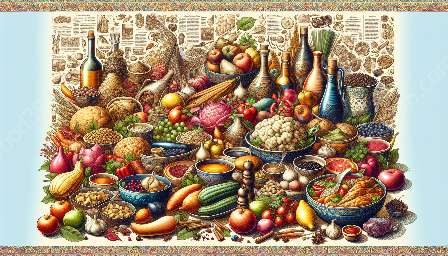Early agrarian societies faced a myriad of challenges; however, through innovation, they developed early agricultural practices that shaped food cultures and laid the foundation for the origin and evolution of food culture.
The Challenges Faced by Early Agrarian Societies
Early agrarian societies encountered several challenges that influenced the development of agriculture and the evolution of food cultures. These challenges included:
- Climate and Environmental Factors: The unpredictable nature of climate and environmental factors posed significant challenges for early agricultural practices. Societies had to adapt to varying weather conditions, soil quality, and natural disasters, which influenced their food cultivation techniques.
- Resource Constraints: Limited access to resources such as land, water, and seeds constrained the expansion of agricultural practices in early societies. Development of innovative methods for resource management was essential for sustaining food cultures.
- Technological Limitations: Early agrarian societies had to overcome technological limitations to enhance food production and preservation. The development of tools and techniques was crucial for sustaining food cultures and ensuring food security.
- Social Organization and Labor: Organizing labor and managing agricultural activities within early societies presented challenges that influenced food culture. The division of labor and the development of social structures impacted food production and distribution.
Innovations in Early Agricultural Practices
Despite the challenges, early agrarian societies were innovative in their approach to agriculture, leading to the development of early agricultural practices that shaped food cultures and laid the foundation for the origin and evolution of food culture. Some key innovations included:
- Crop Domestication: Early societies engaged in the domestication of wild plants, leading to the cultivation of staple crops such as wheat, rice, and maize. This innovation transformed food cultures by providing a stable food supply.
- Irrigation Systems: The development of irrigation systems allowed early societies to harness water resources for agriculture, enabling the cultivation of crops in arid regions and influencing food culture and agricultural expansion.
- Animal Husbandry: The domestication of animals for food, labor, and other resources played a pivotal role in early agrarian societies. This innovation contributed to the evolution of food cultures through the integration of animal products into diets and agricultural practices.
- Storage and Preservation Techniques: Early societies developed methods for storing and preserving food, such as fermentation, drying, and salting, which were crucial for sustaining food cultures and managing food supply.
Origin and Evolution of Food Culture
The innovations in early agricultural practices resulted in the origin and evolution of food culture, shaping the culinary traditions, dietary habits, and social customs of early agrarian societies. Food culture encompassed:
- Culinary Traditions: Early agrarian societies developed culinary traditions based on their agricultural practices, regional resources, and cultural beliefs. This led to the creation of diverse food cultures, each with its unique flavor profiles and cooking techniques.
- Dietary Habits and Nutrition: The evolution of food culture influenced dietary habits and nutrition, as early societies adapted to the availability of food resources, seasonal variations, and cultural preferences. Food culture played a vital role in shaping nutritional practices.
- Social Customs and Festivities: Food culture was intricately woven into social customs, rituals, and festivities within early agrarian societies. The sharing of communal meals, feasts, and celebrations highlighted the cultural significance of food and agriculture.
- Trade and Exchange: The development of food culture facilitated trade and exchange among early agrarian societies, leading to the diffusion of culinary traditions, ingredients, and food preservation techniques.
Conclusion
Early agrarian societies encountered numerous challenges but demonstrated remarkable innovation in developing agricultural practices that shaped food cultures and influenced the origin and evolution of food culture. Understanding the challenges and innovations in early agrarian societies provides valuable insights into the foundations of food cultures and their enduring impact on human history and society.


